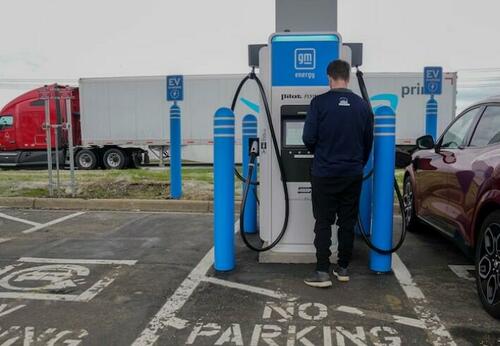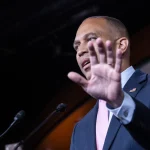
When people gripe about paying taxes and the government being a poor the absolute worst possible capital allocation, this is what they are talking about: $7.5 billion in investments for electric vehicles has - in two years - produced just 7 charging stations across four states.
The Bipartisan Infrastructure Law, signed by Biden in November 2021, allocated $7.5 billion for EV charging, the Washington Post writes. Of this amount, $5 billion went to states as "formula funding" for the National Electric Vehicle Infrastructure program to establish a network of fast chargers along major highways.
Today, there's seven chargers with a total of just 38 parking spots. And, come on: when the Post is calling it out, you know the results have been horrible.
The Post added that with the Biden administration's new emissions rules requiring more electric and hybrid vehicles, the slow pace of charging infrastructure development could hinder the transition to electric cars. Twelve additional states have awarded contracts for charging station construction, while 17 states have yet to issue proposals.
Alexander Laska, deputy director for transportation and innovation at the center-left think tank Third Way, told The Post: “I think a lot of people who are watching this are getting concerned about the timeline.”
The slow rollout of new EV chargers is partly due to higher standards compared to previous fast chargers. The U.S. has nearly 10,000 fast charging stations, including over 2,000 reliable Tesla Superchargers, but non-Tesla chargers often suffer from poor performance.
New Biden administration rules require chargers to be 97% operational, offer 150kW power, and be within one mile of highways. These standards are crucial but slow down progress due to complex rules, permitting challenges, and power demands. The NEVI program aims to boost fast charging capacity by 50% to reduce "range anxiety," but states must first build the chargers.
Cathy McMorris Rodgers (R-Wash.), Jeff Duncan (R-S.C.) and Morgan Griffith (R-Va.) wrote to the Biden Administration last month: “We have significant concerns that under your efforts American taxpayer dollars are being woefully mismanaged.”
“State transportation agencies are the recipients of the money. Nearly all of them had no experience deploying electric vehicle charging stations before this law was enacted,” Nick Nigro, founder of Atlas Public Policy added.
The Federal Highway Administration responded: “We are building a national EV charging network from scratch, and we want to get it right. After developing program guidance and partnering with states to guide implementation plans, we are hitting our stride as states move quickly to bring NEVI stations online.”
“More Americans are buying EVs every day — with EV sales rising faster than traditional gas-powered cars — as the President’s Investing in America agenda makes EVs more affordable, helps Americans save money when driving, and makes EV charging accessible and convenient," a White House spokesperson added.
When people gripe about paying taxes and the government being a poor the absolute worst possible capital allocation, this is what they are talking about: $7.5 billion in investments for electric vehicles has – in two years – produced just 7 charging stations across four states.
The Bipartisan Infrastructure Law, signed by Biden in November 2021, allocated $7.5 billion for EV charging, the Washington Post writes. Of this amount, $5 billion went to states as “formula funding” for the National Electric Vehicle Infrastructure program to establish a network of fast chargers along major highways.
Today, there’s seven chargers with a total of just 38 parking spots. And, come on: when the Post is calling it out, you know the results have been horrible.
The Post added that with the Biden administration’s new emissions rules requiring more electric and hybrid vehicles, the slow pace of charging infrastructure development could hinder the transition to electric cars. Twelve additional states have awarded contracts for charging station construction, while 17 states have yet to issue proposals.
Alexander Laska, deputy director for transportation and innovation at the center-left think tank Third Way, told The Post: “I think a lot of people who are watching this are getting concerned about the timeline.”
The slow rollout of new EV chargers is partly due to higher standards compared to previous fast chargers. The U.S. has nearly 10,000 fast charging stations, including over 2,000 reliable Tesla Superchargers, but non-Tesla chargers often suffer from poor performance.
New Biden administration rules require chargers to be 97% operational, offer 150kW power, and be within one mile of highways. These standards are crucial but slow down progress due to complex rules, permitting challenges, and power demands. The NEVI program aims to boost fast charging capacity by 50% to reduce “range anxiety,” but states must first build the chargers.
Cathy McMorris Rodgers (R-Wash.), Jeff Duncan (R-S.C.) and Morgan Griffith (R-Va.) wrote to the Biden Administration last month: “We have significant concerns that under your efforts American taxpayer dollars are being woefully mismanaged.”
“State transportation agencies are the recipients of the money. Nearly all of them had no experience deploying electric vehicle charging stations before this law was enacted,” Nick Nigro, founder of Atlas Public Policy added.
The Federal Highway Administration responded: “We are building a national EV charging network from scratch, and we want to get it right. After developing program guidance and partnering with states to guide implementation plans, we are hitting our stride as states move quickly to bring NEVI stations online.”
“More Americans are buying EVs every day — with EV sales rising faster than traditional gas-powered cars — as the President’s Investing in America agenda makes EVs more affordable, helps Americans save money when driving, and makes EV charging accessible and convenient,” a White House spokesperson added.
Loading…



